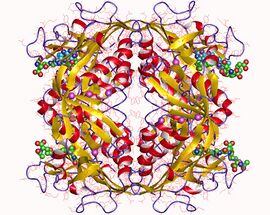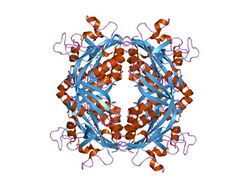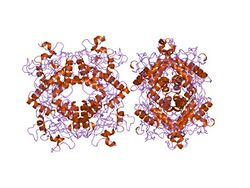Biology:Formylmethanofuran—tetrahydromethanopterin N-formyltransferase
| formylmethanofuran-tetrahydromethanopterin N-formyltransferase | |||||||||
|---|---|---|---|---|---|---|---|---|---|
 formylmethanofuran-THMPT-formyltransferase tetramer, Methanopyrus kandleri | |||||||||
| Identifiers | |||||||||
| EC number | 2.3.1.101 | ||||||||
| CAS number | 105669-83-8 | ||||||||
| Databases | |||||||||
| IntEnz | IntEnz view | ||||||||
| BRENDA | BRENDA entry | ||||||||
| ExPASy | NiceZyme view | ||||||||
| KEGG | KEGG entry | ||||||||
| MetaCyc | metabolic pathway | ||||||||
| PRIAM | profile | ||||||||
| PDB structures | RCSB PDB PDBe PDBsum | ||||||||
| Gene Ontology | AmiGO / QuickGO | ||||||||
| |||||||||
| FTR | |||||||||
|---|---|---|---|---|---|---|---|---|---|
 formylmethanofuran:tetrahydromethanopterin fromyltransferase from methanosarcina barkeri | |||||||||
| Identifiers | |||||||||
| Symbol | FTR | ||||||||
| Pfam | PF01913 | ||||||||
| InterPro | IPR022667 | ||||||||
| SCOP2 | 1ftr / SCOPe / SUPFAM | ||||||||
| TCDB | 9.A.17 | ||||||||
| |||||||||
| FTR, proximal lobe | |||||||||
|---|---|---|---|---|---|---|---|---|---|
 formylmethanofuran:tetrahydromethanopterin formyltransferase from archaeoglobus fulgidus | |||||||||
| Identifiers | |||||||||
| Symbol | FTR_C | ||||||||
| Pfam | PF02741 | ||||||||
| InterPro | IPR002770 | ||||||||
| SCOP2 | 1ftr / SCOPe / SUPFAM | ||||||||
| |||||||||
In enzymology, a formylmethanofuran-tetrahydromethanopterin N-formyltransferase (EC 2.3.1.101) is an enzyme that catalyzes the chemical reaction
- formylmethanofuran + 5,6,7,8-tetrahydromethanopterin [math]\displaystyle{ \rightleftharpoons }[/math] methanofuran + 5-formyl-5,6,7,8-tetrahydromethanopterin
Thus, the two substrates of this enzyme are formylmethanofuran and 5,6,7,8-tetrahydromethanopterin, whereas its two products are methanofuran and 5-formyl-5,6,7,8-tetrahydromethanopterin.
This enzyme belongs to the family of transferases, specifically those acyltransferases transferring groups other than aminoacyl groups. The systematic name of this enzyme class is formylmethanofuran:5,6,7,8-tetrahydromethanopterin 5-formyltransferase. Other names in common use include formylmethanofuran-tetrahydromethanopterin formyltransferase, formylmethanofuran:tetrahydromethanopterin formyltransferase, N-formylmethanofuran(CHO-MFR):tetrahydromethanopterin(H4MPT), formyltransferase, FTR, formylmethanofuran:5,6,7,8-tetrahydromethanopterin, and N5-formyltransferase. This enzyme participates in folate biosynthesis.
Ftr from the thermophilic methanogen Methanopyrus kandleri (which has an optimum growth temperature 98 degrees C) is a hyperthermophilic enzyme that is absolutely dependent on the presence of lyotropic salts for activity and thermostability. The crystal structure of Ftr, determined to a reveals a homotetramer composed essentially of two dimers. Each subunit is subdivided into two tightly associated lobes both consisting of a predominantly antiparallel beta sheet flanked by alpha helices forming an alpha/beta sandwich structure. The approximate location of the active site was detected in a region close to the dimer interface.[1] Ftr from the mesophilic methanogen Methanosarcina barkeri and the sulphate-reducing archaeon Archaeoglobus fulgidus have a similar structure.[2]
In the methylotrophic bacterium Methylobacterium extorquens, Ftr interacts with three other polypeptides to form an Ftr/hydrolase complex which catalyses the hydrolysis of formyl-tetrahydromethanopterin to formate during growth on C1 substrates.[3]
Structural studies
As of late 2007, 5 structures have been solved for this class of enzymes, with PDB accession codes 1FTR, 1M5H, 1M5S, 2FHJ, and 2FHK.
References
- ↑ "Formylmethanofuran: tetrahydromethanopterin formyltransferase from Methanopyrus kandleri - new insights into salt-dependence and thermostability". Structure 5 (5): 635–46. May 1997. doi:10.1016/s0969-2126(97)00219-0. PMID 9195883.
- ↑ "Crystal structures and enzymatic properties of three formyltransferases from archaea: environmental adaptation and evolutionary relationship". Protein Sci. 11 (9): 2168–78. September 2002. doi:10.1110/ps.0211002. PMID 12192072.
- ↑ "Generation of formate by the formyltransferase/hydrolase complex (Fhc) from Methylobacterium extorquens AM1". FEBS Lett. 523 (1–3): 133–7. July 2002. doi:10.1016/S0014-5793(02)02962-9. PMID 12123819.
Further reading
- "The role of formylmethanofuran: tetrahydromethanopterin formyltransferase in methanogenesis from carbon dioxide". J. Biol. Chem. 261 (35): 16653–9. 1986. PMID 3097011.
- "Structure of methanofuran, the carbon-dioxide reduction factor of Methanobacterium thermoautotrophicum". J. Am. Chem. Soc. 106 (12): 3636–3640. 1984. doi:10.1021/ja00324a037.
 |

